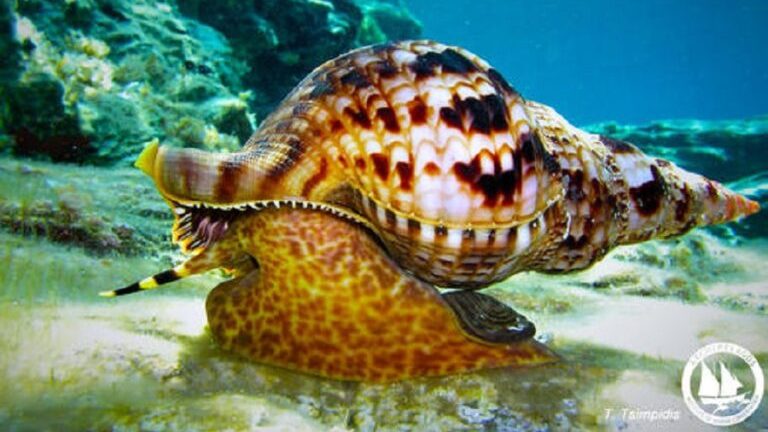Massive Sea Snail Under Threat from Over-Fishing in Greek Waters
Source: Balkan Insight

Triton’s Trumpet Photo: Archipelagos Institute of Marine Conservation
Triton’s Trumpet, the largest sea snail in the Mediterranean growing up to 37cm, is threatened with extinction, according to a Greek marine NGO.
Even though it is a protected species, the Triton’s Trumpet population has been greatly reduced throughout the Mediterranean, because it is being fished for its meat. Its large, colourful shell is also used to decorate people’s homes.
“As a slow-moving animal, it is exposed to anyone who preys on it, either for [food] consumption, or worse, to use its shell as a decoration,” said a statement from the Archipelagos Institute of Marine Conservation (AIMC).
“Overfishing is the main cause of the population decline of bourou, mainly by amateur fishermen, but also by professional [fishermen],” an AIMC spokesperson told BIRN. “Many people use its meat for food consumption [which is] dangerous due to the bioaccumulation of toxic substances found in the marine environment.”
Catching, selling, consuming or collecting the species is illegal under the Conservation of European Wildlife and Natural Habitats law, the Bern Convention, and the Convention for the Protection of the Mediterranean Sea Against Pollution, or the Barcelona Convention, according to the Archipelagos Institute.
Even the snail’s empty shell has an important role in the ecosystem. When the gastropod dies it can become a home for other marine species, for example small octopus and crustaceans.
In the Mediterranean, Triton’s Trumpet, scientific name charonia tritonis, can grow up to 37 cm long, although larger variants are found in seas in other parts of the world. Its name originates from Greek mythology, where the shell was used by Triton, the son of the sea god Poseidon, as a trumpet to calm waves. In Greek, the gastropod is known as ‘bourou’, meaning a large shell that makes a characteristic sound when it is blown into.
The AIMC said the shell of Triton’s Trumpet “protects it from its predators, but it cannot protect it from the detrimental belief that all living organisms on the planet are for human consumption”.
“Refraining from fishing or from removing endangered species from the seas is not sufficient on its own. Each of us can actively contribute to their protection, even by informing and intervening to defend marine biodiversity, which is being increasingly wiped out year after year.”
The original article: belongs to Balkan Insight .



